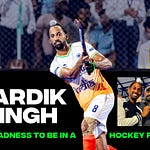Today’s special guest is none other than Arthur De Sloover, famed Belgian 🇧🇪 central defender, known for anchoring the Belgian national team—Red Lions—to historic victories, including Olympic gold, a World Cup, European titles, and high honors like FIH awards. On the domestic level, Arthur currently plays club hockey for Oranje Rood in the Dutch Hoofdklasse and recently featured in the reinvigorated Hockey India League for the Hyderabad Toofans.
With hockey woven deeply into his family’s roots and rich career experiences bridging Belgium, the Netherlands, and India, Arthur brings a nuanced perspective on modern hockey’s evolution. This conversation delves into his journey, Belgium’s rise, balancing hockey with life off the field, and the state of the global game.
Family, Upbringing and Hockey DNA
Ernst kicks off by highlighting Arthur’s hockey lineage and asks about his early beginnings and family connection to the sport.
Arthur warmly recalls, “Honestly, I started playing hockey since I was born. My whole family plays hockey… My grandfather played hockey, my mother and her brother played hockey as well. I just followed my parents to the hockey field from the beginning.”
Notably, he shares how even his niece now wears Belgian colors on the national women’s team—a testament to the family’s enduring love for the sport. For Arthur, this generational connection laid the foundation for his achievements.
A Glittering Career—and What Comes Next
Jaspreet turns to Arthur’s stacked trophy cabinet, acknowledging his Olympic and World Cup successes, and wonders: what’s left on the checklist?
Arthur’s answer is refreshingly candid. While proud of his past, he admits,
“If you look now at the last four or five years, I haven't won anything internationally or nationally… I’m starting to be a bit impatient now to go back for the gold medals.”
He draws motivation from Belgium’s youthful next generation, eager to relive and surpass the “nice things we did in the past.” The hunger for new titles is undiminished.
Defense, Role Models, and the Modern Game
Ernst, always keen on stats, celebrates Arthur’s on-field impact—the Red Lions’ win rate with him playing stands at a commanding two-thirds. Rather than ask Arthur to boast, Ernst asks which defenders Arthur admires today.
Arthur singles out his longtime defensive partner, Arthur Van Doren: “He has shown and is still showing that he's the best one for already a long time… I've learned a lot from him.” Beyond Van Doren, he’s diplomatic: “It's such a broad spectrum… there’s not one player that has everything; every player has his own qualities.” He recognizes the evolution of defense as more crucial than ever, reflecting on recent low-scoring finals and sharing,
“You see that the defensive part of hockey has become more and more important.”
Belgium’s Rise—Keys to Sustained Success
Jaspreet moves into the heart of Belgium’s golden era, tracing roots back to 2016 and asking Arthur what he attributes this sustained success to.
Arthur looks at the long arc of history, especially from the Beijing Olympics (2008) onward, crediting years of behind-the-scenes development: “It has been a big work from a lot of people behind the scenes… not one aspect.” He identifies coach Shane McLeod as a catalyst, describing his arrival before Rio 2016 as “one of the last puzzle pieces,” helping Belgium transform from “a really good team to being the best in the world.” Access to strong infrastructure and coaching from youth up characterized Belgium’s ascent—and now, with new faces coming in, “the structure… is so good that I hope we can still play at the top level for a number of years to come.”
Balancing Hockey, Academics, and Real Life
Ernst rightly notes that hockey doesn’t offer football-sized riches, making life beyond the pitch an inevitable balancing act for players. He asks Arthur about juggling sport and life off the field.
Arthur is pragmatic and grounded: “It was important for me to have something besides [hockey]… I have done business economics studies in Antwerp.” He now works part-time for a private bank during lighter hockey periods—a way to “stay fresh when I play hockey.” Arthur emphasizes the importance of having more than one identity: “I really need that balance to also be busy next to hockey.” Some of his teammates focus solely on sport during their playing years, but for Arthur, a dual path keeps things sustainable.
Hockey India League: A New Experience
Picking up on Arthur’s recent stint with Hyderabad Toofans, Jaspreet probes what he took away from the return of the Hockey India League, particularly the level of India’s talent.
Arthur was impressed and respectful, calling the one-month adventure “very eye opening.” He admits: “I was quite surprised with the level of the Indian players... I was quite impressed with the level and understanding of the game.” The drive he witnessed was inspiring:
“For the Indian players, it’s such an important part of their life… it can literally change their life.”
He came away with deep respect for Indian hockey’s passion and commitment.
India’s Pro League Struggles: Perspective from the Opposition
Turning to international competition, Jaspreet asks Arthur why India underperformed in a recent Pro League European tour, losing seven of eight matches—even one to Belgium.
Arthur resists simple conclusions:
“I don't think they played badly. India is always going to be a tough opponent for every country… Their games were all close calls.”
He highlights key absences, like captain Harmanpreet’s temporary injury, as significant factors, along with logistical challenges. Arthur again sees the big picture: the Indian squad is in partial rebuilding after Paris 2024, with the Pro League as a development stage before the next World Cup. “I know the coach, Craig Fulton… he’s also looking at the bigger picture and not only at the results of today.”
The Sreejesh Effect: Transition in India’s Goalkeeping
Jaspreet next brings up Sreejesh’s retirement and its impact, referencing the legendary Indian goalie’s role in safeguarding numerous victories.
Arthur clearly rates Sreejesh highly: “Not only Sreejesh was a great goalie and a good shot stopper, but he probably also gave a lot of confidence to the team and to the defense in front of him with his experience.” He acknowledges that filling Sreejesh’s spot will take time, and urges patience: “You have to give those goalies games and experience… so they can gain the experience they need for the big tournaments.”
Looking to the European Championships—Belgium’s Squad
Ernst moves the conversation to the EuroHockey Championships, for which Arthur and the Belgian squad are currently preparing. He asks how Arthur rates the new, younger team announced for the tournament.
Arthur is enthusiastically optimistic:
“We have, if I'm not mistaken, five players that play their first big tournament... I have to say I'm very excited about the tournament coming up.”
He’s realistic about expectations—“we’re not the favorite to win the tournament”—but energized by the rapid progress shown by the youth, “We could potentially be a big surprise this tournament. So I'm really looking forward to see the young guys performing well.”
Acknowledging the surprise selection of Loic Van Doren as first-choice goalie, Ernst asks if Arthur was surprised by the non-selection of Vincent Vanasch and what this means for the team.
Arthur calls it “not a surprise for the team,” noting Van Doren’s world-class credentials: “It’s a luxury problem... Loic would be first goalie in a lot of other countries in the world.” He stresses team support for both goalkeepers, and promises the squad has faith in Van Doren for the Euros: “We all support him, we're all behind him and we know that he will also have an important role in our team for these Euros.”
Ernst references newcomer Lucas Balthazar, a young player from a smaller club, noting his rapid rise to the senior squad.
Arthur is very complimentary: “He has made huge steps... If you’re selected at this young age, it shows that you have something special.” What stands out for Arthur is Lucas’s maturity and mentality: “At the age he has and the way he plays, he has a very mature way of playing already.” Selection is no mere experiment—Lucas “really showed during a lot of months that he deserved his spot.”
Where Should Big Tournaments Go? A Question from Joep de Mol
Joep de Mol, Arthur’s club teammate at Oranje Rood in the Dutch Hoofdklasse, poses a thoughtful question via video:
Should hockey’s big tournaments rotate more across new venues, rather than recurring in the same cities and countries?
Arthur agrees wholeheartedly: “If you always organize the tournaments at the same place, you don't reach enough people.” He points to positive recent examples, like the Olympic qualifiers in Oman, and suggests North America as another untapped market. “If we want to give the sport more leverage in the world, we should let it happen at more places than only the same stadiums in India or in Holland.”
Should the Men’s and Women’s World Cups Be Held Together?
Jaspreet wonders if hosting men’s and women’s World Cups simultaneously increases or undermines attention for each event.
Arthur is honest about the complexity: “I think statistically there's always been more interest in men's sports than women's sports. So maybe people of women's sports will like it to be held at the same moment.” Arthur sums up: “For international hockey, I would say it's better taking place at the same time because you can… make it a bigger event. You can probably do a lot of marketing around it.”
Asian Hockey Threats: Who’s Dangerous for India?
Ahead of the Asian continental qualifier, Jaspreet asks Arthur which Asian teams are most likely to challenge India for the World Cup qualifying spot.
Arthur names two: “Pakistan is always going to be a tough opponent, especially for India,” citing the rivalry and stylistic familiarity.
“China, I'm very curious what they will show in the years to come because the women have showed a lot of quality… I would imagine that the men will also want or have gained a lot of trust from that.”
Malaysia and South Korea are noted as inconsistent presences, leaving Pakistan and China as potential disruptors.
Conclusion and Recap
As practice knocks them back to reality at Arthur’s hotel in Germany - at the moment of recording Arthur was in Krefeld where the Belgians were playing some practice games ahead of the European Championships, we came to a close.
Arthur is excited to get to the real stuff at the EC, energized by his young teammates from the Belgian team and the prospect of new challenges.
“I’m very excited… We could potentially be a big surprise this tournament.”
We hope you enjoyed this in-depth episode of Studio Hockey, your go-to podcast for all things international and domestic field hockey. Brought to you by Ernst Baart, bringing the European eye, and Jaspreet Singh, your Asian correspondent—stay tuned for more voices, stories, and perspectives shaping the game we love. Don’t forget to subscribe so you never miss an episode. Happy Hockey!















